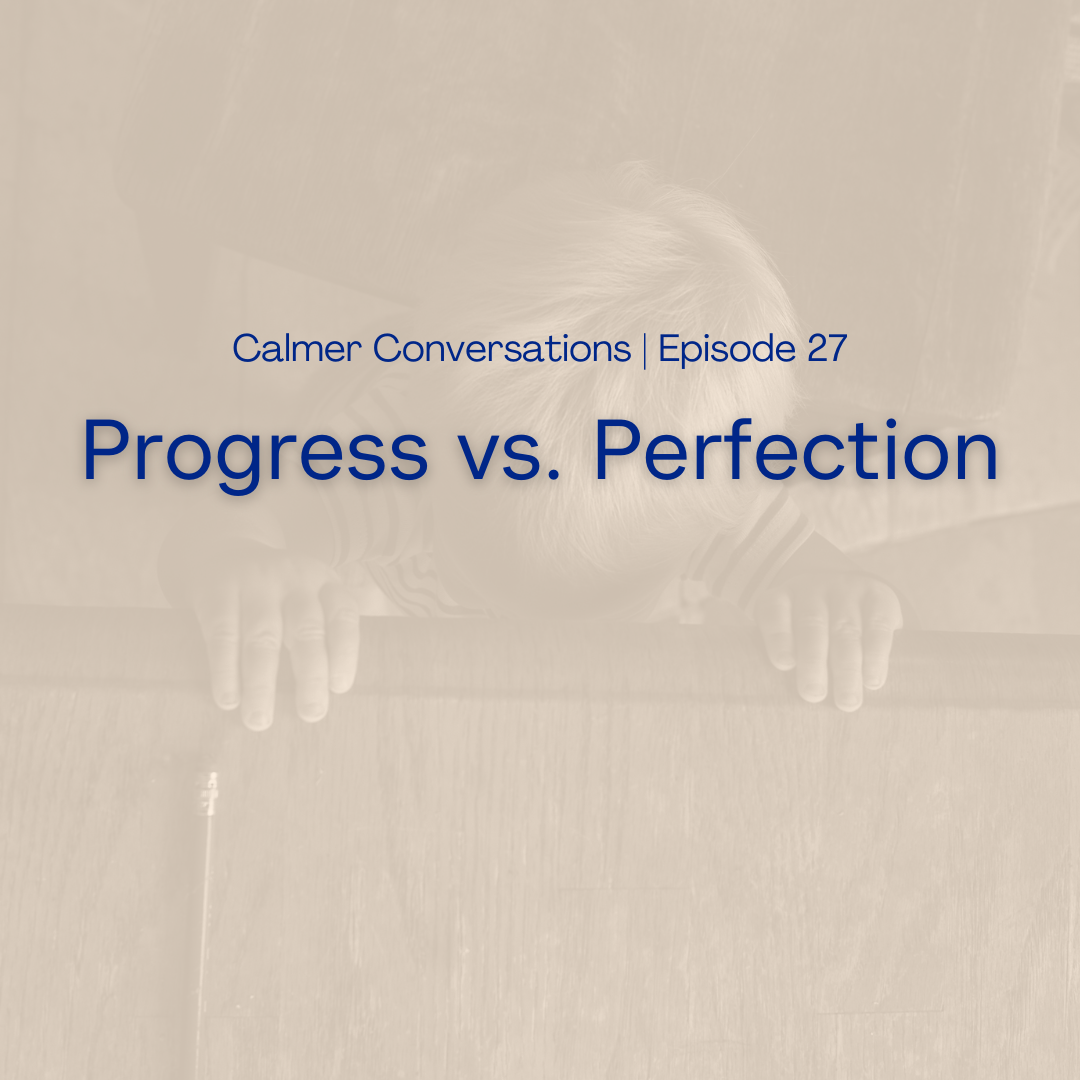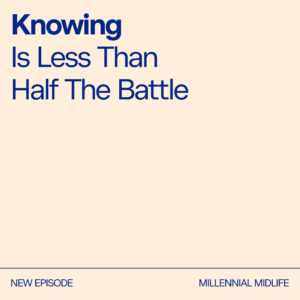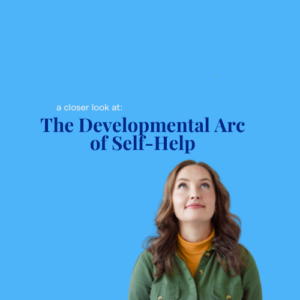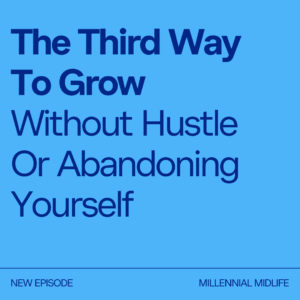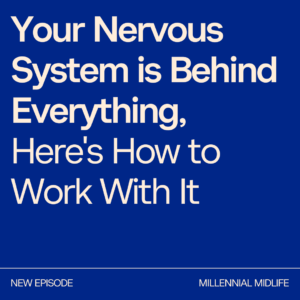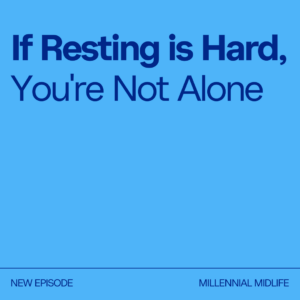Cecelia Baum Mandryk (00:02.328)
Hey, and welcome to Calmer Conversations, episode number 17. I think I got the episode number right this time. I’m Cecilia, your host today. Let’s talk about the difference between perfectionism and progress and how to work with your brain when it wants to go into that perfectionist mode. And it keeps you essentially from making progress. So if this sounds like you, if you’re somebody who feels like they fall into perfectionism or when they try new things, perfectionism often comes up.
and you’d like to maybe just kind of shift that or change it or show up differently, then stick around. This is, think, and honestly, I think a lot of people fall into this. This is kind of like procrastination. Most people do it in some degree and their brain does it in some measure on some things. So even if you don’t consider yourself a perfectionist, you might stick around anyway because I bet you’ll take something away from this episode.
Okay, let’s dive in. So you might have heard the Winston Churchill quote that perfectionism is the enemy of progress. And I think that that’s really true. And I think that that’s something that we see with our brains over and over again. But why does this happen? And why can perfectionism be such a trap? And how do you work with your brain to move from it? So perfectionism, in this case says, if I don’t do it perfectly, then it won’t matter.
or it won’t be effective or ultimately fail. And this has come up several times recently in group coaching and in a course that I’m running that might be over by the time this airs, but that you can still get and you can still participate in. But it is this idea that I have to do it perfectly. And if I don’t do it perfectly, then it’s not worth doing it, right? If I can’t show up to the gym five times a week for an hour and a half, then I shouldn’t even go.
If I can’t run five miles, then it’s not even worth putting on my shoes. If I can’t journal every single day, then I’m not going to journal at all. And so cognitively, most of us can understand how this view of perfectionism gets in our way, right? Because we all know that if you go to the gym four times instead of five times, that’s still a lot. If you go to the gym one time, not five times, that’s still something.
Cecelia Baum Mandryk (02:22.922)
If you journal four days a week, not seven days a week, or you journal 20 days out of every 30 days, you will still probably get something from it. And yet our brain tries to tell us that that’s not the case. And so this is where we get into that disconnect between what we know, and this is a whole nother episode, I think, on its own. As I was writing out the notes for this, I was thinking of it. What we know cognitively.
versus what we’re able to put into practice. Because again, most people, if you sat down and you talked with them, and I’m assuming you fall into this category or listening to this podcast, you sat down and talked to them, they’re to kind of get on board and say, yes, I believe that going for a 10 minute walk three days a week is overall more beneficial than going for no walk, even if it means you’re not going for a 20 minute walk five days a week.
Right, so they would agree that showing up for those four days or three days for a less amount of time is actually more beneficial than not doing anything, even if it maybe isn’t as quote unquote good as going for the perfect, I don’t know, the perfect goal, whatever you have in your brain, right? But the part of us that wants to be a perfectionist and says that it will only work if I do this perfectly wants to tell us that we have to do the perfect thing.
Again, otherwise it won’t matter. It’s not worth it. We’re not gonna get the result. We’re a failure. This is another really classic way that part of your brain keeps you stuck. So part of your brain doesn’t want you to change. And I think the episode right before this one will be the one on the different parts of your brain. So the primitive.
part of your brain and the more like higher thinking or cognitive part of your brain. And so you might want to actually go give that one a listen too. But this is a way that that part of your brain that wants to keep you safe and conserve energy keeps you stuck and keeps you doing exactly what you’re doing. Right? So it keeps you wherever you are because it believes that change is somehow dangerous, that you need to conserve your energy, that you need to avoid
Cecelia Baum Mandryk (04:42.029)
You need to avoid danger in some way. so avoiding danger means getting into these kind of like new behaviors and habits, right? One way this shows up or a lot of times if you are, if you do consider yourself a perfectionist or you do have perfectionist tendencies, there’s this underlying belief too that in order to change, you have to become an entirely new person.
or you have to do something so drastically different that these little small changes won’t add up to anything. And again, this is just another, this is your brain telling you something that essentially makes it hard for you to make progress. It makes it hard for you to actually change because this part of your brain is really invested in you staying the same and you being the you that you have always been. And maybe that’s somebody who…
I know I’ve been using the exercise example a lot recently and somebody who doesn’t exercise or somebody who doesn’t journal or somebody who doesn’t post on social media, right? And it’s actually a very clever mechanism if you think about it, right? So if our brain tells us, we maybe really read some magazine or we get some business advice and it says you’re supposed to post on social media every single day and you’re supposed to post at the same time and you’re supposed to do like five other things around it.
And you so then your brain says okay well the perfect plan is I post every day at the same time and then I comment on five other people’s posts and I don’t actually know all the rules but there are all these rules that people have around things like social media and if you think you can’t do that or if it seems really outlandish you might not even try right like that feels too hard so I’m not even gonna do that or you try to do it
once for one day or one week, or maybe if you happen to have a lot of willpower, then you might be able to do it for a month. And then you slip one day. And your brain immediately will say, it’s all over. You might as well just quit. You skipped that one day. It doesn’t matter. You haven’t made any progress. You should just go back to how you were. This is just proof that you are somebody who can’t follow through. And again, this is so
Cecelia Baum Mandryk (07:07.525)
I was about to use the word beautiful. It just may be just like how my brain thinks of it from a coaching perspective. What a beautiful way for your brain to keep you safe, right? What a beautiful way for your brain to keep you exactly as you have been and exactly as you are. But once you’re onto it, once you can recognize this, you can say, I…
I recognize that my brain is trying to keep me from making progress. Or if you don’t wanna say making progress, my brain is trying to keep me from changing into somebody new, from doing something differently. And I get that. I understand, I’m onto it. I understand what it’s doing. But now I’m gonna check in with myself. And here’s the check-in. The check-in is asking yourself, why do I wanna make this change? Why is doing this thing important to me? And I think this is,
a really, really important step to take because very often we have kind of superficial goals in that they’re something we think we should be doing. So society has told us that it should be a goal or our parents have told us it should be a goal or our friends have it as a goal. And so we haven’t connected with our own why behind it. And in order to work with the different parts of your brain, if you listen to the last episode,
you know that you have to kind of, you have to treat part of your brain like a little bit like a toddler, right? Which is, again, probably a whole nother episode, but you have to treat your brain a little bit like a toddler and help it through some of these things. Understanding your own cognitive why, for why you would do something challenging or difficult is really important for making that change. So, for instance, if we’re going back to the,
to the working out, for instance, your brain wants to tell you, you didn’t go on five runs this week, or you didn’t go to five exercise classes or whatever, and so you’re a failure, you should just quit. We can pause and we can hold ourselves there, and we can say, cognitively, we can ask, is that true? Is it true that it didn’t matter, that those other four classes don’t count because they didn’t go to the fifth? And if we’ve regulated our nervous system in that moment,
Cecelia Baum Mandryk (09:23.988)
most of us can really truthfully answer, no, that’s not true. Even the one class I went to mattered. Or even the fact that I drove to the gym and thought about going to a class matters because that’s me living into my future self and becoming that future self, which is somebody who regularly moves their body and exercises. So you can ask that, right? We can engage with the perfectionist. Actually here, this is actually how I want to frame this.
If you remember a couple episodes ago, and this is just really a tenet of all of the things that I present, but that your brain generally is not telling you the truth. And it’s certainly not telling you the truth with a capital T. It is telling you its most practiced version, its most practiced story to keep you safe and conserve energy and keep you exactly where you are. And so when your brain tells you this doesn’t matter, it’s not true.
and you can engage with the part of your brain that says that. And you can do it really gently and compassionately. You don’t have to judge yourself for doing this, right? And in fact, I would encourage you not to judge yourself, because that will just bring up more resistance in your nervous system and you’ll just stay even more stuck. But you can recognize my perfectionist brain is stepping in here. And now I’m going to engage with it. Now I’m going to pause. And so the first engagement might be to ask, it true that it doesn’t matter?
If I have been journaling for 20 days and skip the 21st, is it true that those 20 days don’t matter or aren’t moving me towards who I want to be and where I want to be? Is it true that doing something perfectly is necessary to get the benefit from it? And most of us, again, cognitively can really truthfully say, no, you don’t have to do things perfectly to get benefit from it.
You can do things really imperfectly, in fact, and still get a lot of benefit from them. I’m laughing because I can just think of all the things that I’ve done extremely imperfectly and how much I’ve gotten from them, right? And in fact, if we then connect with a why would I want to do this? Why am I doing this? Why am I journaling? Well, I’m journaling because I want to change the neural pathways of my brain so that I see myself differently. So I’m thinking about the WINS course that I that I’m currently in the
Cecelia Baum Mandryk (11:50.754)
process of teaching live, but that there is a journal that you can get and there is a course that you can actually go through. And the whole purpose of this course is to help your brain understand, to relate differently to how you show up, which is actually like kind of the underlying theme of this episode, is that getting your brain to see
little small changes and little small ways you’re showing up as adding up to bigger wins in your life and noticing how little progress actually makes big progress and So when you start to connect with your why and say, okay. Well, why am I journaling every day? Well, I want to change the neural pathways of my brain. Okay. Well, is it is it actually true that
If I did this for 20 days and I skipped the 21st day and maybe even the 22nd day, maybe even the 23rd day, is it true that I didn’t get any benefit from those first 20 days? No, because you can actually go and you can see where you did get benefit. And you can ask yourself, what would I have to believe to start again today? If I didn’t think I was a failure, if I didn’t think that I needed to do this perfectly to get the benefit from it, why would I start again today?
Why would I not make this into a big deal in my brain? And I would just say, it’s okay. I skipped a week of exercise. No big deal. I can go to the gym again tomorrow. And I can continue to get benefit from it by re-engaging and re-engaging with the attitude of I’m here to make progress and I’m here to live into the version of me who does show up to move their body, who does take time to reflect every day by journaling, who does engage with their brain to understand the thoughts.
and nervous system states that are there so that I can shift and change them. That’s what I’m trying to do. And I don’t do that by being perfect. I do that by being consistent, by being and not not perfectly consistent. I hesitated on using that word because I think sometimes then we just turn that into perfection. But by coming back, by having the courage to come back to something over and over again and
Cecelia Baum Mandryk (14:06.142)
the courage to not beat myself up. And so this actually showed up in, I think it was in the wins course last week when we had a live session, is that our brain isn’t afraid of failure. In fact, our brain is very used to failure, quote unquote failure, which means that like you skipped a day of journaling, right? Our brain is afraid of how we’re going to make ourselves feel when we fail or make a mistake. So our brain is afraid of being beat up.
which is like if we’re in, if we go back to the, your brain is keeping you safe, your brain is keeping you safe from yourself because at some point you haven’t done something perfectly and maybe you or somebody else used it as an excuse to be mean to you, to shame you, to say something rude or unpleasant to you. And so you can make the decision now that says that I actually am really interested in the progress trajectory.
I’m interested in moving forward. And I know that there going to be some hard things here. And this is a whole other episode too, where we have a couple going on here. I’m going to go through the Valley of Despair or the River of Misery. Things are likely going to get hard. But I’ve connected with my own why around this, why I want to make these changes, why this is important to me. And so I’m committed to doing this imperfectly.
And I’m committed to reminding myself regularly that it’s not the perfection that gets the change. It’s the showing up and having the courage to show up even when I’ve quote unquote failed or missed a day or only did it for five minutes instead of 45 minutes the day before. And if I continue to do this, what I end up doing is I train my nervous system to feel safe in the trying.
I train my brain with new neural pathways to become the person who continues to show up. And I also commit and retrain my brain to saying, I will not beat myself up when things don’t go exactly as planned. Because honestly, like nothing ever is going to go exactly as planned, right? Like we live human lives. You might have, you probably have a job or you have kids or you have a partner or you just live in the world and like things are going to happen. You’re going to get sick or something’s going to come up and you’re going to skip a day and that’s okay.
Cecelia Baum Mandryk (16:31.308)
The problem isn’t the skipping the day. The problem is beating yourself up for skipping the day and then buying into the belief that nothing matters because you did something imperfectly. And again, there’s this other thing that’s usually happening with the perfectionist, the kind of like perfectionist fantasy around these things is that if I do something perfectly, I will become a new person and then I will suddenly be worthy, good,
I don’t know, amazing, lovable, whatever it is in your own brain, right? We all have our own words, acceptable. We all have our own words around this. But that’s what our brain actually thinks. So if I, I mean, I used to, if you’ve come to any of my workshops, you know that I used to make like the Sunday plan for the week. And it was my fantasy of what I was going to do that week to become a new person, to be perfect so that I was lovable and worthy. And it would be like,
I mean, it would be essentially like 48 hours of activity for every 24 hours that I needed to do this way and I just eat this kind of food and do this kind of exercise, journal and blah, blah, blah, blah, blah, blah. And then I would be perfect, right? I needed to change into this new human being. And the second I couldn’t do that perfectly, which was usually like Monday or Tuesday, sometimes it was later, then I would feel really…
down on myself and I’d feel a lot of shame and embarrassment and I’d feel really guilty and then next Sunday would come and I’d get really excited because I could make a whole new plan and I think this is the week that I’m going to be a new person. You don’t, you can make changes, right? Like the whole point of this podcast is to help you make changes. But you don’t need to become a new person. What you need to do is work with your brain exactly where it is and make space for the part of you that feels like it needs to be perfect to make changes. Change those thoughts and
continuously work on showing up for yourself in the most human, imperfect way that you will do it because that’s again how we are as people. Okay, so when your brain says if I don’t do it perfectly it doesn’t matter, you can say I hear you. I hear what you’re saying and I know what you’re doing. I know you’re trying to keep me safe and I promise I’m not gonna beat you up anymore. I promise I’m not going to hold it over your head that you didn’t do this perfectly.
Cecelia Baum Mandryk (18:52.172)
and I can connect to my why. And I do believe that showing up imperfectly will get me further than trying to be perfect all the time. And I will use whatever this is as a way to start to untie these knots in my brain and change how I’m showing up so that I can start to live into the person who I actually want to be, which is…
a perfectly imperfect human, right? I believe in your capacity to do this, right? You’re essentially saying like, can be somebody who values reflection or daily movement or whatever it is, and I can do it in a way that honors my humanity because I want to keep showing up for the long haul for myself. Okay, so if you struggle with perfectionism and you’d like to be making more progress, I hope that this was helpful.
Again, knowing that perfectionism is just a habit your brain is in and it’s another habit that’s trying to keep you safe, I think is really helpful, right? Just to know there’s nothing wrong with me, nothing has gone wrong, my brain is trying to help me, just doing it in a kind of weird way. And now that I know that it’s doing it and it’s in this habit, I can engage with it. I can have the conversation with myself around this so that I can shift the perfectionist tendencies and then I can start making the progress that I want to make.
And I commit to seeing that progress as the principle of the wins course, right? I commit to seeing that progress each day and acknowledging it to myself and saying I did this imperfectly and I can keep doing it again tomorrow. Thank you so much for joining this week. As always, if you’d like to, if you’d like to really get into this and actually like if you want a way to work with that perfectionism in the moment, I have this mini course called the five minute shift, which really helps you
Name and acknowledge and work with emotions in the moment. It’s really powerful with something like perfectionism So you can grab that there’s a link in my profile But also come to coaching join the club come like let me see your brain Let me help you work through this so that you can show up differently for yourself and make the progress that you want to make Alright, I love you all so much. I hope you have a beautiful day, and I will see you next time

